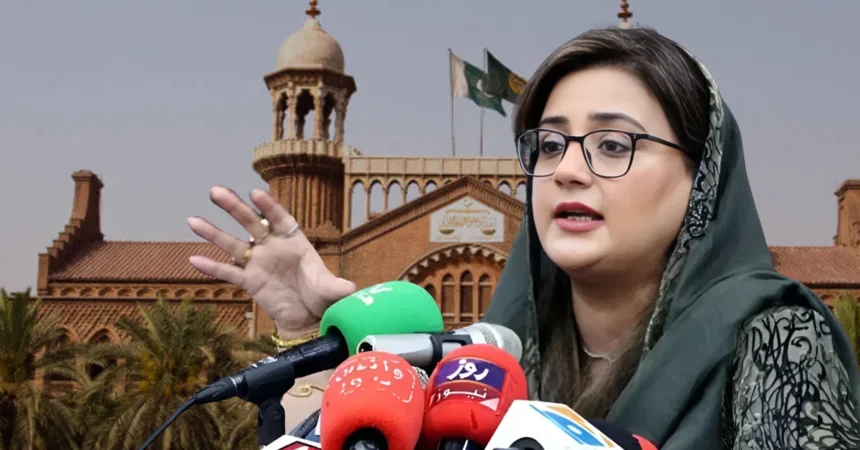In a landmark decision, the Lahore High Court (LHC) has directed the consolidation of various harassment cases and ban cases involving prominent Pakistani politician Azma Bukhari. This ruling comes at a time when issues surrounding harassment and the treatment of women in politics are receiving heightened attention in Pakistan. The implications of this decision extend beyond the immediate legal context, impacting societal attitudes towards harassment and the judicial system’s role in addressing such matters.
Background on Azma Bukhari
Azma Bukhari, a well-known member of the Pakistan Muslim League-Nawaz (PML-N), has been an outspoken advocate for women’s rights and has actively participated in political discourse in Pakistan. Her work has often placed her in the spotlight, both for her political stance and her commitment to addressing issues related to gender equality. However, her visibility has also made her a target for harassment and political attacks.
- Political Career
Bukhari’s political career has been marked by her dedication to advocating for the rights of women and marginalized communities. She has consistently used her platform to raise awareness about gender-based violence and discrimination, positioning herself as a leader in the fight for social justice. However, her outspoken nature has not come without consequences, as she has faced backlash and harassment from political opponents and societal norms.
The Court’s Ruling
By consolidating these cases, the court seeks to reduce potential delays and enhance the efficiency of the judicial system in handling sensitive issues of harassment. This ruling reflects a commitment to creating a more effective legal framework that prioritizes the rights and safety of individuals, particularly women, in the political arena. Furthermore, it emphasizes the need for accountability among public figures and serves as a pivotal moment in the ongoing struggle against harassment in Pakistan.
- Legal Implications
By ordering the consolidation of cases, the LHC is taking a proactive approach to streamline the judicial process. This decision reflects an understanding of the intricate nature of harassment cases, where multiple allegations may arise from a single incident or a pattern of behavior. The consolidation of cases allows for a more thorough examination of the evidence and circumstances surrounding the claims, promoting justice and accountability.
Public Reaction
The public reaction to the Lahore High Court’s decision has been mixed, with various stakeholders expressing their views on the implications of the ruling.
- Support from Women’s Rights Activists: Many women’s rights activists and organizations have welcomed the decision as a significant step towards addressing harassment in Pakistan. They view the ruling as an acknowledgment of the challenges faced by women in the political sphere and a commitment to providing a safer environment for female politicians.
- Concerns About Legal Processes: However, some legal experts have raised concerns about the efficiency of the judicial process in handling such cases. The consolidation of cases could lead to delays, and there are questions about whether the legal system is adequately equipped to handle the sensitive nature of harassment allegations.
- Political Ramifications: The ruling also has political ramifications, as it brings increased scrutiny to the behavior of politicians and the culture of harassment within political circles. As discussions surrounding harassment gain prominence, politicians may face greater pressure to adopt more respectful and ethical practices.
Support from Women’s Rights Activists
Many women’s rights activists and organizations have hailed the Lahore High Court’s decision as a groundbreaking move toward addressing the pervasive issue of harassment in Pakistan. They believe this ruling acknowledges the systemic challenges faced by women in the political sphere, emphasizing the need for a safer environment for female politicians. Activists argue that such decisions can empower women to speak out against harassment without fear of reprisal, thereby promoting greater female participation in politics.
- Quotes from Activists
Activists have expressed their optimism regarding the ruling, with statements emphasizing the importance of legal recognition of harassment issues. Some have stated, “This is a monumental step toward justice for women in politics. It sends a clear message that harassment will not be tolerated and that women have the right to work without fear.”
Concerns About Legal Processes
Despite the positive reception from activists, some legal experts have raised concerns about the judicial system’s capacity to handle the complexities of harassment cases. The decision to consolidate various cases may result in prolonged legal battles, which could ultimately disadvantage the victims seeking justice. Critics argue that the legal framework must be more agile and equipped to address the nuanced nature of harassment allegations effectively.
- Efficiency of the Judicial System
Questions about the efficiency of the judicial system are paramount, especially given the existing backlog of cases in Pakistani courts. Legal analysts have pointed out that while consolidation may streamline proceedings in theory, it could also lead to delays in justice for victims. “We must ensure that victims are not left waiting indefinitely for a resolution,” one legal expert remarked, emphasizing the need for a timely and effective judicial process.
Political Ramifications
The Lahore High Court’s ruling brings heightened scrutiny to politicians and the culture of harassment in political circles. With increased public awareness of harassment issues, politicians may face greater pressure to demonstrate ethical behavior and accountability. This ruling could serve as a catalyst for reform within political parties, pushing them to adopt more robust policies against harassment.
- Impact on Political Culture
As discussions around harassment become more prominent, political parties may need to reassess their internal practices and codes of conduct. There is a growing recognition that fostering a respectful political environment is crucial for attracting diverse talent and maintaining public trust. “This is an opportunity for political leaders to lead by example and create a culture that upholds dignity and respect for all,” said a political analyst.
Media Coverage and Public Discourse
Media coverage of the ruling has played a significant role in shaping public discourse around harassment in politics. Coverage has ranged from detailed analysis of the legal implications to opinion pieces advocating for reform. The increased visibility of the issue has encouraged more citizens to engage in discussions about harassment and the treatment of women in politics.
- Social Media Reactions
Social media platforms have also become a forum for public reactions to the ruling. Many users have expressed support for Azma Bukhari and called for greater protections for women in all sectors. Hashtags related to the ruling have gained traction, amplifying the conversation around women’s rights and harassment in Pakistan.
Community Support Initiatives
In response to the ruling and the broader conversation about harassment, community organizations have initiated support programs for victims of harassment. These initiatives aim to provide resources, legal assistance, and counseling services for individuals who have experienced harassment, particularly in political and professional contexts.
- The Role of NGOs
Non-governmental organizations (NGOs) are stepping up efforts to create awareness and offer support. They are launching campaigns to educate the public about harassment and the importance of reporting incidents. “It’s crucial to foster a culture where individuals feel empowered to come forward and seek help,” stated a representative from an NGO dedicated to women’s rights.
The Broader Context of Harassment in Pakistan
The issue of harassment, particularly against women in Pakistan, is pervasive and deeply rooted in societal norms. Cases like that of Azma Bukhari highlight the challenges faced by women who dare to enter the political arena.
- Societal Attitudes: The culture of harassment in Pakistan is often perpetuated by societal attitudes that trivialize or dismiss the experiences of victims. Many women face intimidation and threats when speaking out, creating an environment where silence is often seen as the safer option.
- Legal Framework: While there are laws in place aimed at protecting individuals from harassment, the implementation of these laws remains inconsistent. Victims often face numerous hurdles in seeking justice, including societal stigma, lack of support, and an inadequate judicial system.
Future Considerations
The Lahore High Court’s decision represents a pivotal moment in the fight against harassment in Pakistan. As the cases involving Azma Bukhari move forward, several key considerations will shape the landscape of harassment law and the treatment of women in politics.
- Need for Legal Reform: The ruling underscores the need for comprehensive legal reform to better protect victims of harassment. This includes ensuring that the judicial process is not only efficient but also sensitive to the needs of victims.
- Support Systems for Victims: Establishing robust support systems for victims of harassment is crucial. This includes providing legal aid, counseling services, and safe spaces for women to share their experiences without fear of retaliation.
- Awareness and Education: Raising awareness about harassment and educating the public about its consequences is essential for changing societal attitudes. Campaigns aimed at fostering a culture of respect and accountability can help shift the narrative around harassment in Pakistan.
The Lahore High Court’s decision to club the harassment and ban cases involving Azma Bukhari is a significant step towards addressing the challenges faced by women in the political arena. As society grapples with issues of harassment, this ruling serves as a reminder of the need for comprehensive reforms, support systems, and a collective commitment to fostering a safer and more equitable environment for all individuals. The path forward will require collaboration among legal experts, activists, and the community to ensure that justice prevails and that the rights of women are upheld.
#AzmaBukhari #LahoreHighCourt #HarassmentCases #WomenInPolitics #JusticeForWomen #LegalReform #Pakistan







